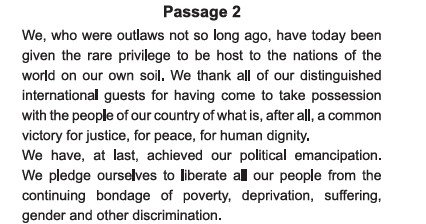Summary of Nelson Mandela: Long Walk to Freedom
Chapter 2 of the Class 10 English textbook, ‘First Flight’, is titled Nelson Mandela: Long Walk to Freedom. It is an autobiography of Nelson Rolihlahla Mandela. He was the first black South African President, an anti-apartheid revolutionary and political leader who served the country from 1994 to 1999. Here, we bring you a summary of the prose in the form of CBSE Notes. Students can go through the prose summary of an extract from the “Long Walk to Freedom” book. It includes an illustration of Nelson Mandela’s inauguration ceremony and excerpts from his speech and the struggles he faced as a freedom fighter. CBSE Class 10 students can also refer to CBSE Class 10 English Prose Notes – Nelson Mandela: Long Walk to Freedom for their Board exam preparation.
Nelson Mandela: Long Walk to Freedom is an extract from the autobiography of Nelson Rolihlahla Mandela that describes the struggle for freedom of black people in South Africa. On 10th May 1994, Nelson Mandela took the oath as South Africa’s first Black President after more than three centuries of White rule. His party had won 252 out of the 400 seats in the first democratic elections in the history of South Africa.

Passage 1
- Read the extracts given below and attempt the questions that follow:
The ceremonies took place in the lovely sandstone amphitheatre formed by the Union Buildings in Pretoria. - For decades this had been the seat of white supremacy, and now it was the site of a rainbow gathering of different colours and nations for the installation of South Africa’s first democratic, non-racial government
- On that lovely autumn day I was accompanied by my daughter Zenani. On the podium, Mr de Klerk was first sworn in as second deputy president. Then Thabo Mbeki was sworn in as first deputy president When it was my turn, I pledged to obey and uphold the Constitution and to devote myself to the wellbeing of the Republic and its people. To the assembled guests and the watching world.
- IMPORTANT QUESTION
- Where did the ceremonies take place?
- Which ceremony is being referred to here?
- What pledge did Nelson Mandela take?
(a) To uphold the constitution
(b) To devote himself to the wellbeing of the people
(c) To eliminate racism
(d) All of the above - Which political party did Nelson Mandela belong to?
(a) ANC
(b) BBC
(c) CBC
(d) None of these - The phrase ‘rainbow gathering’ means
(a) All races, nations, politicians
(b) People wearing different shades
(c) Audience with coloured flags
(d) The rain had caused a rainbow
Answers
- The ceremonies took place in the lovely sandstone
amphitheatre. - Installation of the non-racial government is being referred to here.
- d. All of the above
- a. ANC
- a. All races, nations, politicians

IMPORTANT QUESTION
Who does ‘We’ refer in the first line of the passage?
- What is the privilege that has been explained in the passage?
- The guests at the spectacular ceremony are being called distinguished because
(a) they have been invited as guests to attend it.
(b) they are eminent world leaders witnessing it
(c) they are visiting the country for this purpose
(d) they have resumed diplomatic relations with the country. - It is a victory for ‘human dignity Pick the option that lists the correct answer for what ‘human dignity’ would include.
(a)i) equality ii) liberty iii) indecency
(b) i) liberty ii) indecency iii) self-respect
(c) i) immorality ii) self-respect iii) equality
(d)i) liberty (ii) equality iii) self-respect - The word ‘bondage’ means in the passage


IMPORTANT QUESTION
- Who does ‘these comrades’ refer to here?
- What defies the imagination?
- When Nelson Mandela says, “I have seen men and women risk and give their lives for an idea”, he means that they are
(a) stubborn
(b) committed
(c) intelligent
(d) proud - The speaker uses the phrase ‘time and again’ when he talks about how his countrymen risked their lives. Which of the following is NOT the correct meaning of this phrase?
(a) Something that happens every time.B SOMETHING THAT HAPPENS OFTEN.C, AS A ROUTINE D, SOMETHING THAT HAPPENS FROM TIME TO TIME - Select the suitable word from the extract to complete the following:
Depths: night :: compassion:





Long Answer Question (100-120 words)
(6 Marks)
- Would you agree that the “depths of oppression” create “heights of character”? How does Mandela illustrate this? Can you add your own examples to this argument?
Ans: Yes, it is true that the depths of oppression create heights of character. Nelson Mandela ilustrated this argument by giving examples of some people of extraordinary courage and wisdom. This period of struggle to end apartheid produced people like Oliver- ANS 1 Tambos, the Walter Sisulus, Bram Fischers and so on in the soil, of South Africa, Nelson Mandela himself was a product of the same conditions. The hunger for freedom changed his life. The history of India is full of such characters Mangal Pandey, Bhagat Singh, Chandra Shekhar Azad, Mahatma Gandhi, Lala Lajpat Rai and so on were the people of extraordinary courage produced by the depth of oppression in India.
- Create a questionnaire of the two most important questions that you would like to ask Nelson Mandela during an interview. Give the reasons for choosing those questions.
- Your teacher organised a mini-debate competition in class on the topic: Courage, Wisdom and Generosity are the only attributes of a remarkable leader. Write the debate script with two points to support your stand, either as a proposition speaker or as an opposition one.
